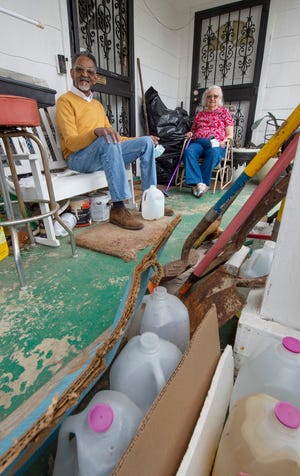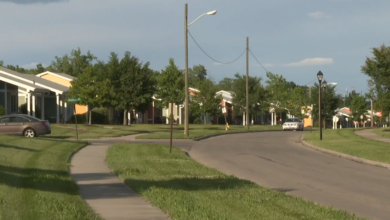
Jackson, MISS. -- Less than two miles from the Mississippi's Capitol building, an elderly Black man hoards water.
James Brooks, 78, keeps rows of plastic containers of water at his Jackson home filled with varying shades of gray, yellow and brown water. On the porch. In the kitchen. In the bathroom. Water from the tap, water from Walmart, water from the melting snow on the roof of his car, boiled water, distilled water, most of it collected drip by drip and stored. There are so many gallon containers, it is hard to walk, especially for his wife Jean, who uses a cane.
And at the end of his front porch, a 99-gallon trash container, which he began filling in 2019, holds even more water because Brooks has been, for 30 years, drowning in anxiety.
"You would hear stories about the water," Brooks said. "The word was out. The infrastructure in Jackson was in bad shape. You have to worry about what is under the asphalt."
Decades of neglect, under investment and refusal to fix the water infrastructure have resulted in a crisis in Jackson, where residents are struggling to find water for daily living.
"We live in a predominantly Black community, and I don't think we are high on the list of priorities," Jean Brooks said.

Mississippi's capital city enters week 4 of a water crisis:Here's how it got to this point
Jackson, Mississippi's biggest city, has a population of just under 170,000, of which 81% are Black. More than 25% of Jackson's residents live below the poverty line, and the median household income is about $38,000.
James Brooks points to houses around his block. The lady across the street keeps buckets to catch rainwater. A man across the way is doing the same. In Jackson, water buckets are a way of life.
Bad water is as persistent in Jackson as a birthmark.
Sometime in the 1980s, Brooks began dealing with the water on his own. He ripped out the pipes under his house and installed a new system. He insisted he and his wife only drink bottled water, a habit that has changed into drinking only distilled bottled water. And then, he began the hoarding.
"I was getting upset with him because this is crazy," Jean Brooks said. "I felt like I was going to scream."
Neither James nor Jean Brooks is crazy. He has a master's degree in economics, a doctorate in social work. He was a military policeman in Vietnam, a college professor, a Black Power advocate back in the day. She, too, was a college professor, a hippie and she remembers, years ago, raising her voice to city officials about the potholes on her drive home from Jackson State University.
No end in sight:Mississippi's capital city hasn't had clean water in weeks
James and Jean Brooks have never called anyone to complain about the water. Fighting, they said, is pointless. She said she simply showers with her eyes closed because she worries about what the water will do to her vision.
Current politicians, who control the funding that could fix the water problems, have said the scope of the city's problems are larger than they're able to handle on their own.
In 2013, an assessment of the city's water system found there are pipes that are at least 100 years old in many areas. Past city administrations have put money into the system, but it's resulted in patchwork bandages that do little to address the root of the problem.
Today, city leaders say there's not enough funding to do what needs to be done. Jackson's tax base is dwindling. As it stands, Jackson Mayor Chokwe Antar Lumumba admits the city hasn't been able to cover even routine maintenance for the system.
"The question then becomes why we haven't been able to effectuate the routine maintenance that is needed and that comes down to a matter of resources," Lumumba said Monday.
Weeks after Mississippi winter storms:Some residents still don't have water
Or they blame the residents themselves for not paying the bills. A study in 2019 showed as many as 20,000 residents had not paid water bills. The issue is due in part to an ill-fated contract the city entered into with Siemens Industry Inc., in 2012 to improve its water meter and billing system. The result was a tangled mess of underbilling, overbilling and some residents not getting bills at all, which culminated into a $450 million lawsuit.
The city reached a settlement for $89.8 million — roughly the amount paid to Siemens in the original contract — in 2020, but collections are still an issue.
When presented with several requests for comment from the Clarion Ledger, part of the USA TODAY Network, about when service would be restored, officials could only offer tentative dates, all of which came and went. Lumumba explained Monday a $2 billion price tag that has been floated for weeks is a combination of a previous sewer system evaluation from the U.S. Environmental Protection Agency and water system studies the city has commissioned over the years.
Thousands of residents of Jackson have been without water since the frigid storm of Feb. 15, and thousands more have been advised to boil the water that comes out of the tap because it could be filled with bacteria. Some of the pumping stations stopped working. More than 100 water mains broke.
The ice storm only illuminated the problem.
This is not a new phenomenon.
Long history of water troubles
The problem started with a private water delivery system built in 1888 and purchased by the city in 1908. It is a problem as old as the Yazoo clay on which Jackson is built. Yazoo clay is susceptible to weather changes, shrinking and expanding like an accordion beneath the streets, mangling water mains in the process.
As far back as 1982, winter storm systems atypical for the South have turned Jackson's water system into a sprinkler when the weather eventually warms.
A historic ice storm that hit the state in 1989 caused 182 lines to rupture and caused outages for days. In 2018, frigid temperatures caused more than 200 water main breaks across the city before crews were able to stabilize the system.
Following the storm in mid-February, more than 100 breaks happened across the city. Boil water advisories are exceedingly common, but no one in the city can recall a full outage lasting for nearly as long as the current crisis.
And breaks aren't the only problem. The city issued precautions in 2016 when elevated lead levels were found in the tap water at some residences. Although the levels at the time weren't found to be in violation of the Safe Drinking Water Act, expecting mothers and young children were advised to avoid drinking anything coming out of Jackson's system.

The city's sewer system also remains under a consent decree from the EPA due to Clean Water Act violations.
Despite all the problems, major investment into the system hasn't happened for several years. Without help from the state and federal governments, city leaders say it's unlikely they will have to means to do so.
Public works nightmare
For several years, Jackson's public works department has suffered from staffing shortages and underfunding.
Prior to former Jackson Public Works Director Bob Miller's departure in July 2020, several positions were open in the department, which affected the ability to respond to breaks. In 2018, at least 60 positions went unfilled in the department. Several positions are still open today.
Revenue has been another issue. Because of the the issue with water billing, the department has had to turn to the city's general fund to cover budgeting shortfalls.
Current Public Works Director Charles Williams said lack of funding has also affected the agency's ability to make needed fixes at the city's water and sewage treatment plants. More money, he said, is necessary to address the problems.
"One thing that I'll tell you: I don't need an excuse to spend money in Jackson," Williams said Monday. "We have a lot of deficient areas that relate to our infrastructure systems, and (with) our ability to be able to utilize (funding) for the betterment of our community, we'll use it to its fullest."
The forgotten neighborhood
James and Jean Brooks said they feel neglected by the people who could help them. Their neighborhood, they said, has been forgotten.
"The institutional knowledge is gone," Brooks said.
They know it shouldn't be like this.
James Brooks points to the house next door where an elderly woman is renting.
The house is owned by Jackson City Councilman Charles Tillman, who represents Ward 5 in west Jackson. It has been reported that Tillman owns 65 houses in this neighborhood.
Tillman, who once served on the Keep Jackson Beautiful committee and is the former chair of Jackson's budget committee, currently is the vice chair of the city's water ad hoc committee.
Tillman said he's known about the problems plaguing the water system since he joined the council in 2005. There isn't a city council meeting where it isn't mentioned to some degree, he said.
"It's like the problem is bigger than this city," Brooks said.
Tillman agreed. Although the city has to do its part, he said he feels a partnership is the only way to make headway into the issue.
"We need a system from county government, state government and federal government," he said. "When we are in need, that's what government is for — to take care of people in need."
Tillman, who has been investing in Jackson properties since the late 1960s, said he uses his own crew to replace the pipes in all the houses he buys before he rents them out. He estimated 35 of his houses are filled now.
A helping hand:As Jackson's water crisis continues, outside communities are bringing water to residents in need
A one-bedroom house, he said, could cost between $1,500 to $2,000 to re-pipe.
There haven't been problems in the household pipes at those homes, he said, but the city connections have caused issues. Some of his tenants have told him for years they feel that because Jackson is a predominantly Black city, state officials don't care about them.
Tillman said there's a possibility their thoughts could have weight when you look at where the state has chosen to invest in the city in the past.
"Other than the (Mississippi State Capitol Building) where they (are), and the state fairgrounds, and maybe some other parts of the city, the rest of the city — which is primarily minority — is not getting the attention we need," he said.
Tillman said he's been advocating for changes to the water system for years, but knows the problem won't go away overnight. New studies of the entire system will need to be done and he said he knows it won't be easy — or cheap.
"Like my daddy always used to say, if you'll pardon the expression, it's gonna take a good chunk of money," he said. "We have studies sitting on the shelves, but if we want to go after this problem, we need an update to know what we're dealing with from the beginning."
Contributing: Justin Vicory, Mississippi Clarion Ledger.
Follow Keith Sharon on Twitter: @KeithSharonTN
Follow Keisha Rowe on Twitter: @KeishaRoweCL
Source link








